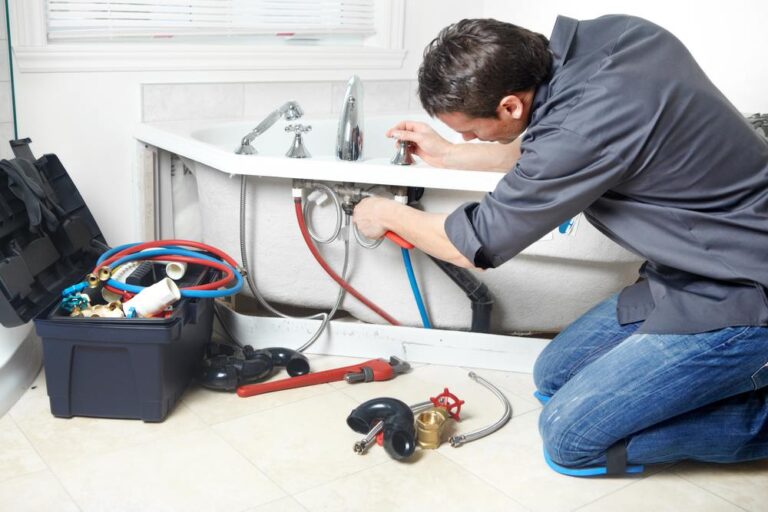Gas lines aren’t something most folks think about until they need a new stove or want to add that outdoor curtain.
But getting gas lines installed right isn’t just about making things work—it’s about keeping your family safe. When gas lines go wrong, they go really wrong.
That’s why knowing how professional plumbers tackle this job matters so much.
Cleburne plumbers have gotten gas line installation down to a science.
They mix old-school know-how with new techniques that make everything safer and better.
Let’s walk through exactly what happens when the pros install your gas lines, and why their methods keep your home running without worry.
How To Install Gas Lines Safely and Smart By Cleburne Plumber
Most homeowners don’t realize there’s a whole process behind gas line installation.
It’s not just about connecting pipes.
A skilled plumber Cleburne brings trusted experience to each step—from checking what you already have to making sure the final system runs perfectly.
The real pros follow a proven path that puts safety first while getting the job done right.
Initial Inspection and Planning
When thinking about initial inspection and planning for gas lines, I need to consider how Cleburne plumbers approach this critical first step.
They don’t just walk in and start cutting pipes. Instead, they take time to understand the whole picture.
First, they check out your existing gas system—where the meter sits, what the pressure looks like, and how many appliances already run on gas.
They’ll figure out where new lines need to go while avoiding trouble spots like electrical wiring or water pipes.
Smart plumbers always map the shortest, safest route for new gas lines.
They also calculate how much gas your kitchen appliances need.
A tiny gas line might work for a stove, but it won’t cut it for a whole-house generator.
Getting these numbers right means your fireplace, water heater, and cooking range all get enough gas even when they’re running at the same time.
The planning stage might seem like wasted time when you’re eager to fire up that new gas grill, but it prevents headaches down the road.
Good plumbers know that careful planning now saves emergency calls later.
Choosing the Right Materials
Gas line materials aren’t all created equal.
Cleburne plumbers typically work with three main options, each with its own set of pros and cons.
Black iron pipe has been the go-to for decades.
It’s super tough—you could whack it with a hammer and probably just dent it.
The threads on these pipes create rock-solid connections that don’t budge.
But installing it takes muscle and time. You need pipe wrenches, threading tools, and pipe dope to seal those connections.
It’s labor-intensive but incredibly reliable.
Then there’s CSST—that yellow flexible stuff that looks a bit like a vacuum hose.
It bends around corners and through walls without needing tons of fittings.
You can run it much faster than a rigid pipe, kind of like pulling electrical wire. The catch? It costs more per foot, and you need special fittings that aren’t cheap either.
Plus, it can get damaged more easily during construction or remodeling.
Some newer systems use press-fit connections on black iron pipe.
This gives you the strength of iron with faster installation.
The plumber uses a special tool that crimps the fitting right onto the pipe—no threading needed.
It’s quick and clean, but those tools cost thousands, so only serious professionals usually have them.
Cleburne plumbers weigh all these factors—your home’s needs, your budget, and long-term reliability—before picking the right material.
They’re not just thinking about today but about how your system will work 20 years from now.
Proper Shut-Off and Safety Precautions
The first rule of gas work? Make absolutely sure the gas is off before touching anything.
This isn’t something to guess about.
Professional plumbers in Cleburne start by finding the main shut-off valve near your meter.
They turn it completely off, then verify no gas is flowing.
Many use special detectors that can sniff out even tiny amounts of gas in the air.
They’ll also make sure everyone in the house knows the gas is off, so nobody tries to light the stove or run the dryer.
Good ventilation is crucial during gas work.
Pros open windows and doors and sometimes bring fans to move air through the space.
They keep fire sources far away—no smoking, no pilot lights, no electrical sparks.
The right tools matter too.
Plumbers use spark-resistant wrenches and other specialty equipment designed specifically for gas work.
They wear proper gear including gloves and eye protection.
These precautions might seem like overkill, but professional plumbers know better than to take shortcuts with gas.
One mistake could lead to leaks, fires, or worse.
Their careful approach keeps everyone safe while they work.
Precision in Installation
Gas line installation isn’t a place for “close enough.” Proper installation demands precision at every step.
When running the actual lines, professional plumbers make sure pipes slope slightly toward the gas source.
This prevents condensation from pooling in the lines.
They support pipes correctly—too few hangers and the pipe might sag; too many tight straps and the pipe could stress at connection points.
Connections get special attention.
With threaded black iron, plumbers wrap the male threads with yellow gas-rated tape, then add pipe compound before tightening.
They don’t overtighten—that can crack fittings—but get them snug enough to prevent leaks.
For CSST systems, cutting the tubing to exact length matters.
Too short and it might pull under tension; too long and it could kink.
The special fittings need to be installed according to manufacturer specs, with the right tools and techniques.
Press-fit systems require clean, straight cuts and the correct jaw size on the pressing tool.
Plumbers check that the fitting is fully seated before pressing and verify the crimp looks right after.
Through the whole process, they keep everything clean.
Dirt, metal shavings, or debris inside gas lines can damage appliances or cause blockages.
Good plumbers run a little extra gas through the system before final connections to blow out any leftover particles.
Testing for Leaks
After installation comes the moment of truth—testing for leaks.
This step separates the real pros from the rest.
Cleburne plumbers typically use pressurized air or nitrogen to test new gas lines, not actual gas.
They pump the system to a specific pressure—usually higher than normal operating pressure—and watch to see if it holds.
They’ll check the gauge after 15 minutes, then again after several hours on bigger jobs. Any pressure drop means there’s a leak somewhere.
For finding the exact leak location, they use soap solutions.
When brushed onto fittings and connections, this solution bubbles up wherever gas escapes.
Some plumbers also use electronic leak detectors that can find even tiny leaks human senses would miss.
All connections get checked—every single one, no exceptions.
The pros don’t assume a connection is good just because they did it right; they verify.
They document these tests too.
Professional plumbers keep records of test pressures, duration, and results.
This documentation protects both them and you, proving the system was leak-free when installed.
Final Connections and System Check
The last mile of gas line installation involves connecting your appliances and making sure everything works perfectly.
Each appliance connection gets its own shut-off valve—this lets you turn off gas to just one device if needed.
Plumbers use flexible connectors for appliances that might move during cleaning or maintenance, like stoves and dryers.
Before firing up appliances, pros perform a complete system purge.
This pushes out any air that got into the lines during installation.
They’ll carefully light pilot lights or test automatic ignition systems on each appliance.
Then comes a final inspection of how appliances actually run.
They check flame color—it should be blue, not yellow or orange.
They make sure burners light quickly without delayed ignition.
They verify that safety systems like thermocouples and flame sensors work correctly.
Good plumbers also show you how to turn off gas in an emergency and explain what gas smells like so you can recognize potential problems.
They’ll give you contact information for questions or concerns that might come up later.
Smart Practices Used by Cleburne Plumbers
What sets the best Cleburne plumbers apart isn’t just following the basic steps—it’s their extra attention to detail.
Top plumbers keep learning about new products and techniques.
Gas codes change, materials improve, and installation methods get safer.
The best pros stay on top of these changes.
They think about the future too. When running new lines, good plumbers consider what might be added later.
They might install capped tees at strategic points so adding a future gas fireplace or outdoor kitchen doesn’t require tearing into walls again.
Documentation matters to serious pros.
They create detailed maps of where gas lines run, especially lines that will be hidden behind walls or underground.
This makes future work safer and easier.
They’re honest about material contrast too.
While CSST might be faster to install, a good plumber will tell you when black iron makes more sense for durability.
They recommend based on what’s truly best for your situation, not what’s easiest for them.
Why Hire a Professional Cleburne Plumber?
Gas isn’t something to mess around with.
Professional plumbers bring serious training and experience to the job.
They know local codes cold. Different cities have different requirements for gas line installations—pros keep up with Cleburne’s specific rules.
They pull permits when needed and arrange for inspections with local authorities.
Pros carry proper insurance too.
If something goes wrong during installation or years later, professional plumbers stand behind their work.
That peace of mind is worth something.
The right tools make a huge difference.
Professional plumbers invest thousands in specialized equipment that most homeowners would never buy for a single project.
These tools make the job safer, faster, and more reliable.
Time matters too. What might take a homeowner days of frustration can often be knocked out in hours by someone who does this work regularly.
Plus, they know how to work without tearing up your whole house.
Conclusion
Gas line installation demands serious know-how and careful work.
Cleburne plumbers bring both technical skills and safety awareness to every job.
From picking the right materials to testing every connection, they follow processes that keep your home running smoothly and safely.
When you see how much goes into proper gas line work, it’s clear why professional installation matters.
The best plumbers combine old-school craftsmanship with new technology to create gas systems that work perfectly for decades.
That’s the real value of hiring a pro for this critical home system.



